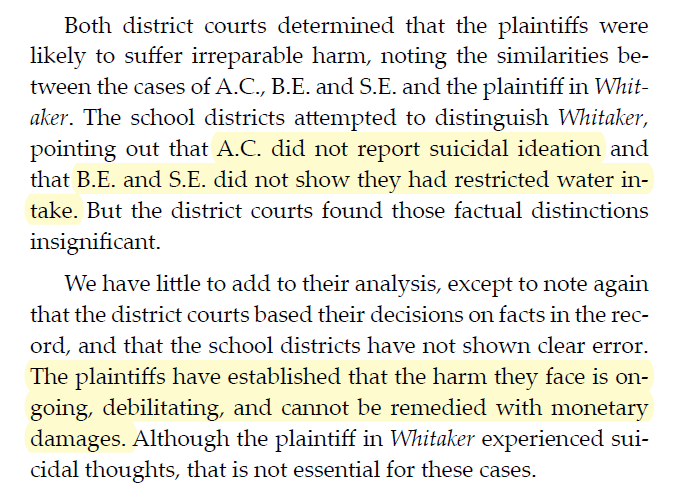7th Circuit Affirms Bathroom Rights For Trans Youth, Reject "Gender Neutral Alternatives"
The 7th Circuit Court of Appeals ruled yesterday that transgender youth can use the bathroom of their gender identity, reaffirming an earlier ruling.
The 7th U.S. Circuit Court of Appeals has ruled that transgender youth can continue to use bathrooms in accordance with their good-faith gender identity in Indiana, and it has rejected an effort by school districts to overturn a lower court's preliminary injunction. This means transgender youth in the state continue to have the right to access bathroom facilities, and policies barring them are blocked in states within the circuit's jurisdiction. This places the 7th Circuit in agreement with the 4th Circuit but in opposition to the 11th Circuit on the bathroom access issue, something that likely will only be resolved with the case being heard by the U.S. Supreme Court, potentially in the near future.
The case in question centers on three transgender boys in the Metropolitan School District of Martinsville and the Vigo County School Corporation. The students were required to use the bathrooms corresponding to their sex at birth or gender-neutral restrooms that were far from their classes, often making them late and revealing their transgender status. One boy traveled across the school to the health office bathroom only to find it locked on numerous occasions, leading at times to embarrassing accidents. Some of the boys would hold their bladders to the point that it posed a health threat and aggravated existing health problems. Because of this, a lower court judge ruled that the policies were harmful to them and violated their civil rights under Title IX and the Fourteenth Amendment's right to equal protection under the law.
In the majority opinion by the 7th Circuit Court of appeals, the court was asked to revisit a previous ruling where it had affirmed the rights of transgender students to use the bathroom of their gender identity, a case known as Whitaker v. Kenosha Unified School District. The 7th Circuit declined to revise its earlier ruling, and in fact seemingly strengthened it - the court pointed out, for instance, that a recent Supreme Court decision - Bostock v. Clayton County - makes it even more clear that discrimination against transgender people is sex discrimination and renders policies such as these unconstitutional.
The court was particularly critical of the idea that “gender neutral facilities” amounted to a reasonable accommodation, stating that the the facilities, though “separate,” were absolutely not equal:
The court also tackled directly the idea that transgender bathroom use will “invade other student’s privacy” and that allowing transgender youth to use the bathroom would result in “genital exposure,” as the school districts asserted. The court responded with skepticism, pointing out that there are stalls in bathrooms, and that none of the students shared showers. “The district is fighting a phantom,” the court opinion stated. It then cited its earlier ruling:
“Common sense tells us that the communal restroom is a place where individuals act in a discreet manner to protect their privacy and those who have true privacy concerns are able to utilize a stall.” Whitaker, 858 F.3d at 1052. Martinsville has not identified how A.C.’s presence behind the door of a bathroom stall threatens student privacy.
In a last ditch effort, the school district then tried to argue that precedent did not apply to these transgender youth because they hadn’t suffered enough. They argued that one student “did not report suicidal ideation” whereas the other two students “did not restrict their water intake,” and so this meant that the prior precedent would not apply. The court gave this absolutely no credit:
Ultimately, the court acknowledged that these cases are likely headed to the Supreme Court. In 2017, the 7th Circuit Court decided that Ashton, a transgender high school senior, has the right to use the boys' restroom. Likewise, in 2020, the 4th Circuit Court sided with Gavin Grimm, a transgender boy, against the Gloucester County School Board. However, recently, the 11th Circuit Court ruled in favor of a Florida school, stating that its bathroom policy requiring a transgender student to use separate bathrooms was likely constitutional. This creates a "circuit split," which makes a Supreme Court case much more likely.
Until that split is resolved, however, many people are protected by the aforementioned decisions. The ruling follows a series of decisions that have overturned health care policies, sports bans, drag bans, and even defeated the assertion that there is a "right to bully" transgender individuals. Transgender students in Indiana may feel relief today, and transgender individuals everywhere may be encouraged by the significant success seen in courts against these policies.





The lawyers for the schools are absolute ghouls.
The “if you aren’t suicidal we haven’t bullied you enough” subtext from the school is chilling af